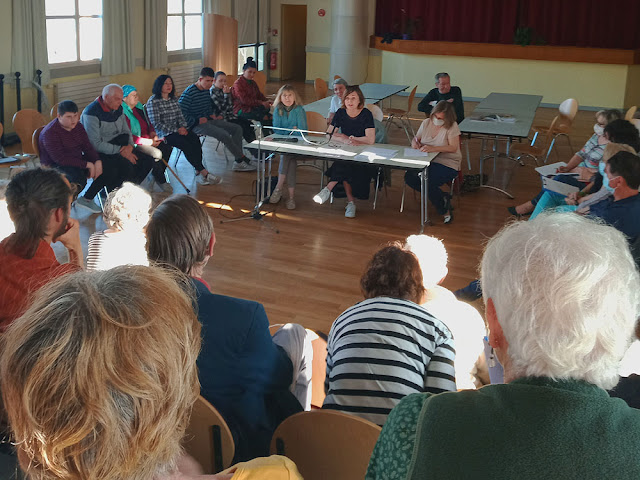Every town and village in the Sud Touraine now has at least one Ukrainian family in their midst. They've arrived as refugees, usually with very little. When I say families, I mean women and children and grand parents. There are no single women, and no men between 18 and 60 -- they are still in Ukraine, with the armed forces or civil defence. Families are in fact separated and will experience two different wars, which is a concern in the long term. I fear for those who will end up widowed or so changed that they divorce.
A network of help has very quickly sprung up, driven primarily by two young local women who are Ukrainian by birth, but have lived here in the Touraine for some years. Nina and Valeria are amazing. They have organised vanloads of supplies going to the Ukraine, and those volunteer driven vans evacuate people who are fleeing the conflict. They are very clear about what needs to be done once they are here -- find accommodation, get people the proper residency status, get them into the health system and the kids into school, get them jobs and transport, and most importantly of all, get them into French classes.
 |
| A public meeting of AARST, with a newly arrived Ukrainian refugee family on the left, Valeria in black in the middle, Nina to her right in blue, Christiane behind them. |
We already had a volunteer organisation to welcome refugees in Preuilly sur Claise, created when there was a real crisis in Syria a few years ago. But Syrian refugees did not want to come to rural France, and indeed the French authorities discouraged them settling outside of the bigger centres as it meant they would be isolated, with no compatriots for support, and potentially no access to transport or jobs.
The same applies to the Ukrainians, but has worked out differently. Nina and Valeria are aware of the challenges, but are adept at managing partnerships with everyone from the sports clubs to the prefecture, and Preuilly's volunteer organisation to help refugees has been revived, with a name change to reflect our broader outlook. It has become the Association d'Accueil des Réfugiés en Sud Touraine (AARST).
I'm on the committee, along with various friends. My role is to organise social outings so the refugees can meet people and make friends. Others are doing the more serious and urgent tasks of taking people to the prefecture and CPAM (the healthcare insurer). Organisations like ours are also bridging a gap that has opened up between those who wish to offer accommodation and those who need it. Theoretically the prefecture was managing this, with whizzy new software, but whilst both groups can easily register on the website, there seems to be some impediment to matching people up. Groups of private volunteers like us are simply sidestepping it and relying on personal networks to get everyone in accommodation in a timely manner.
Of course the uncertainty of not knowing if and when they can go back to Ukraine makes everything from getting a job to signing the lease on a house difficult. And it's not just the things they need to sort out immediately that are stressful. Ukrainian drivers licences are not automatically transferable to French ones, so if they are still here in a year they face doing a French driving test. This is one of the reasons Valeria is emphasising the need to learn French. Special classes have been set up within the school system for the kids, and local authorities are organising classes for adults. Several people at the meeting put their hands up to say that they had experience of teaching French as a foreign language.
Apart from Valeria and Nina, the other person who ensured the success of the public meeting is Christiane, the president of the Association. A week before, she called everyone she thought could help, to get a clear idea of what could be done and by whom. That's how I ended up on the committee.
I'm glad to say that my only personal Ukrainian contact of prior to the war, a highly regarded entomologist of much the same age as me, based in Kyiv, has made it to Berlin with his wife, with the support of the Natural History Museum there. I'm sad to say that my local Russian friends are feeling like they need to keep a low profile, despite them being vehemently against the war.
The committee is meeting tonight to further develop our action plan and to establish teams for doing the various tasks needed.

No comments:
Post a Comment